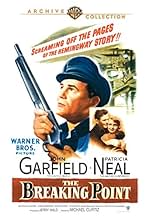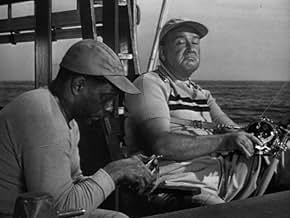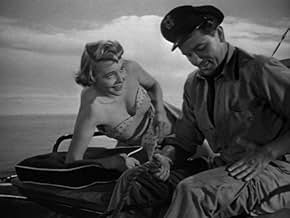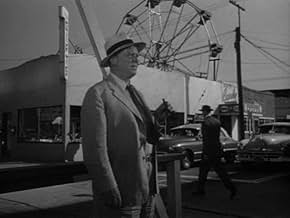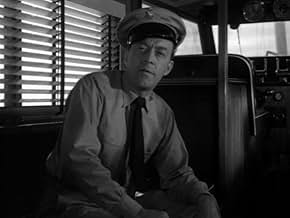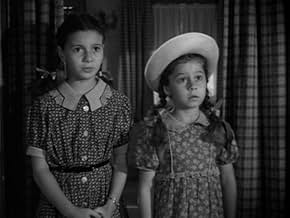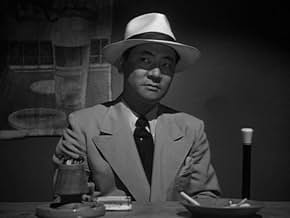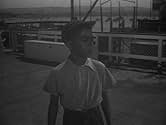NOTE IMDb
7,5/10
4,7 k
MA NOTE
Ajouter une intrigue dans votre langueAn otherwise moral captain of a charter boat becomes financially strapped and is drawn into illegal activities in order to keep up payments on his boat.An otherwise moral captain of a charter boat becomes financially strapped and is drawn into illegal activities in order to keep up payments on his boat.An otherwise moral captain of a charter boat becomes financially strapped and is drawn into illegal activities in order to keep up payments on his boat.
John Alvin
- Reporter
- (non crédité)
Chet Brandenburg
- Taxi Driver
- (non crédité)
Peter Brocco
- Macho
- (non crédité)
Mary Carroll
- Girl at Bar
- (non crédité)
Spencer Chan
- 1st Chinese Immigrant
- (non crédité)
John Close
- Deputy
- (non crédité)
Histoire
Le saviez-vous
- AnecdotesAccording to TCM's Eddie Muller, John Garfield thought this was his best performance and that it was the film of which he was most proud.
- GaffesWhen she first steps onto the boat, Patricia Neal's voice is heard saying "we're off to sunny Mexico," but her lips aren't moving.
- Citations
Harry Morgan: You know, my wife dyed her hair.
Leona Charles: Coincidentally I've been thinking of letting mine grow out. Speaking of coincidences, I live in Number Seven. My friends just kick the door open.
- Crédits fousTHE END close out. All lettering aligned and centered except for the line beneath Warner Bros. that begins PICTURES. It's left registered with whatever wording that followed it 'air brushed' over using the lower right drop shadow pattern leaving a Warner Bros. Pictures _?_?_?_?_ mystery.
- ConnexionsFeatured in The John Garfield Story (2003)
- Bandes originalesPlease Don't Talk About Me When I'm Gone
(uncredited)
Music by Sam H. Stept
Lyrics by Sidney Clare
Sung by Patricia Neal in the bar
Commentaire à la une
With the Depression, the so-called "upper class," the subject of so many plays and films, began to fade and be replaced by the work of playwrights such as Clifford Odets.
John Garfield was the type of leading man who came out of that kind of working man play -- more rugged than romantic, more blue collar than white collar, more at home in a leather jacket than a tuxedo. That leading man type would peak post-war with the likes of Dean, Brando, Steiger, Newman, McQueen, and others. But their predecessor was John Garfield.
Here he stars in his second-last film, as he would soon be blacklisted -- it's "The Breaking Point," based on the Hemingway novel "To Have and Have Not," but not really like the Bogart-Bacall film, which borrowed the title.
In "The Breaking Point," Garfield plays Harry Morgan, who runs a charter boat in California. He has a wife, Lucy (Phyllis Thaxter) and two daughters (Sherry Jackson, Donna Jo Boyce). Times are tough (the original novel took place during the Depression) and Harry is having trouble making enough money to pay off his boat and raise his family.
Lucy wishes her husband would work for his father on his lettuce farm in Salinas, but Harry says all he knows is boats.
Because he needs money, Harry agrees to carry out a shady deal, transporting Chinese to the United States. But when he is cheated out of most of his money, he returns the men where he picked them up. However, someone rats on him and he nearly loses his boat.
When the boat's owner threatens to take the boat for nonpayment, Harry agrees to another shady deal; this one proves more dangerous.
Very intense film which also stars Juano Hernandez, who was wonderful in so many films until his death in 1970; Patricia Neal in her "babe" days, as a former boat passenger who is attracted to Harry; and Wallace Ford, as a foolish man involved in nefarious schemes. William Campbell, whose big claim to fame was that he was married to JFK's girlfriend Judith Exton, plays a low-level criminal.
John Garfield gives a brilliant performance as a stubborn, intense, desperate man who doesn't know where to turn. His last movie, He Ran All the Way, was a B movie and a clear indication that, thanks to the Communist witch hunt, he was on his way out. He died two years later.
Beautifully directed by Michael Curtiz, the end of the movie is especially poignant.
John Garfield was the type of leading man who came out of that kind of working man play -- more rugged than romantic, more blue collar than white collar, more at home in a leather jacket than a tuxedo. That leading man type would peak post-war with the likes of Dean, Brando, Steiger, Newman, McQueen, and others. But their predecessor was John Garfield.
Here he stars in his second-last film, as he would soon be blacklisted -- it's "The Breaking Point," based on the Hemingway novel "To Have and Have Not," but not really like the Bogart-Bacall film, which borrowed the title.
In "The Breaking Point," Garfield plays Harry Morgan, who runs a charter boat in California. He has a wife, Lucy (Phyllis Thaxter) and two daughters (Sherry Jackson, Donna Jo Boyce). Times are tough (the original novel took place during the Depression) and Harry is having trouble making enough money to pay off his boat and raise his family.
Lucy wishes her husband would work for his father on his lettuce farm in Salinas, but Harry says all he knows is boats.
Because he needs money, Harry agrees to carry out a shady deal, transporting Chinese to the United States. But when he is cheated out of most of his money, he returns the men where he picked them up. However, someone rats on him and he nearly loses his boat.
When the boat's owner threatens to take the boat for nonpayment, Harry agrees to another shady deal; this one proves more dangerous.
Very intense film which also stars Juano Hernandez, who was wonderful in so many films until his death in 1970; Patricia Neal in her "babe" days, as a former boat passenger who is attracted to Harry; and Wallace Ford, as a foolish man involved in nefarious schemes. William Campbell, whose big claim to fame was that he was married to JFK's girlfriend Judith Exton, plays a low-level criminal.
John Garfield gives a brilliant performance as a stubborn, intense, desperate man who doesn't know where to turn. His last movie, He Ran All the Way, was a B movie and a clear indication that, thanks to the Communist witch hunt, he was on his way out. He died two years later.
Beautifully directed by Michael Curtiz, the end of the movie is especially poignant.
Meilleurs choix
Connectez-vous pour évaluer et suivre la liste de favoris afin de recevoir des recommandations personnalisées
- How long is The Breaking Point?Alimenté par Alexa
Détails
- Durée1 heure 37 minutes
- Couleur
- Rapport de forme
- 1.33 : 1
Contribuer à cette page
Suggérer une modification ou ajouter du contenu manquant

Lacune principale
By what name was Trafic en haute mer (1950) officially released in India in English?
Répondre


